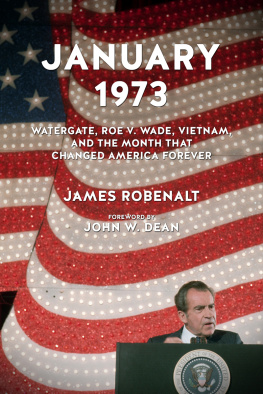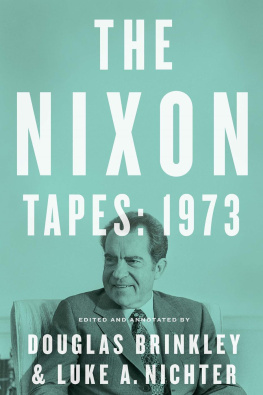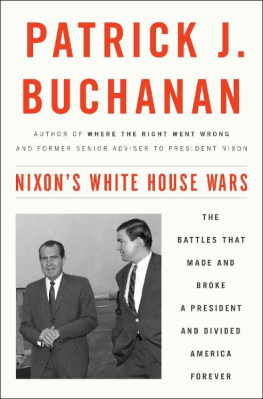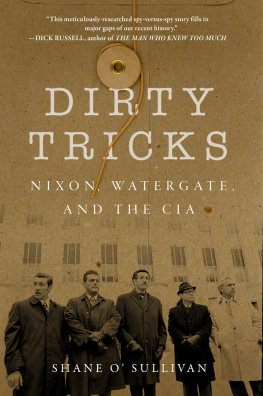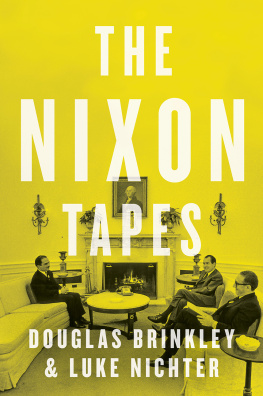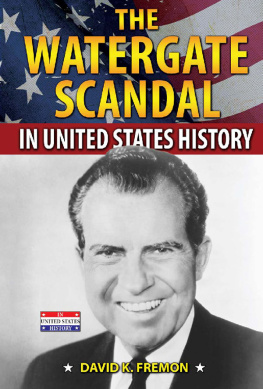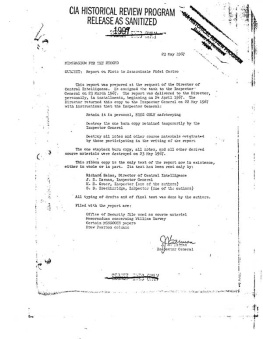FROM
JANUARY 1973
As 1973 dawned, the domestic calm that prevailed was a thin veneer. The stock market was reaching new highs, but within a year, after another devastating Middle East war and an oil embargo, the economy would be in real trouble. The cutoff of oil would touch off both a severe recession and trigger high inflationstagflationa vexing condition that would persist well into the 1980s. For this and other reasons, the stock market would start a long downward spiral after reaching its high in January 1973.
Under the surface ominous forces were churning. The trial of the Watergate burglars was scheduled to begin in the second week of January, casting a menacing shadow that Nixon could not ignore. He was bedeviled by this scandalthis third-rate burglarythat simply would not go away, even in the face of his landslide victory in November.
By January 1974, only one year later, Judge John J. Sirica would be on the cover of Time as the Man of the Year, and Richard Nixon would be scrambling to explain an eighteen-and-a-half-minute gap in a White House tape recorded several days after the break-in. By then, Nixons presidency would be in a death spiral.
All of that seemed unfathomable as January 1, 1973, began. Most of the presidents advisors were out of town, still on holiday vacations, enjoying the fruits of their hard work in the 1972 reelection campaign. Everyone assumed that the worst was behind them and that the second term would be less tempestuous than the first.
Copyright 2015 by James Robenalt
Foreword copyright 2015 by John W. Dean
All rights reserved
Published by Chicago Review Press Incorporated
814 North Franklin Street
Chicago, Illinois 60610
ISBN 978-1-61374-965-4
Library of Congress Cataloging-in-Publication Data
Are available from the Library of Congress.
Cover design: John Yates at Stealworks
Interior design: PerfecType, Nashville, TN
Printed in the United States of America
5 4 3 2 1
To Joanna, whose love sustains me
CONTENTS


Index
FOREWORD
Because Jim Robenalt, your author, is my friend, more than a brief note from me could be properly suspect. But the fact of the matter is that I truly enjoyed reading this book, so I am delighted he asked me to write a foreword to broadly introduce him and his work.
Together Jim and I teach a Continuing Legal Education (CLE) seminar for attorneys based on my experiences at the Nixon White House during Watergate, viewing them with the modern rules of legal ethics and professional responsibility. I suggested Jim join me in doing these seminars because I knew he was interested in history and he is a skilled trial lawyer. As such, I appreciated that not only is he good on his feet, but more important, he also understands information analysis and the techniques of effective presentations. These talents not only result in good CLE programs, which engage and entertain as they inform, but they are essential for a good book as well. Jims ableness will become abundantly clear in the pages that follow.
I watched this book develop from its inception, so I can attest to the time, energy, and effort that was devoted to digging out the information underlying the extraordinary confluence of events he noticed occurring in January 1973, which are the basis of this book. This is Jims third book. When his colleagues ask him how he finds time to practice law, teach CLEs, and write books, he often jokes that he doesnt play golf. In fact, he is a quick study, an experienced researcher, and an accomplished writer.
This book emerged from his study of Watergate and the Nixon White House for our CLE seminars. It was while digging into primary source material to develop our second program that he first noticed the unique intersection of a series of seemingly disparate events that occurred in January 1973, each event with varying degrees of connection to the Nixon White House: the ending of the Vietnam War and the beginnings of new problems for the Nixon Administration; the beginning of the ending of the Nixon presidency with the Watergate break-in trial; the beginnings of the debate over ending a womans pregnancy, which was addressed by the US Supreme Court ruling Roe v. Wade; and finally there were the endings of the lives of two former presidents of the United States, Harry Truman and Lyndon Johnson.
These events, both the beginnings and endings, could not have occurred in a more appropriate month than January, a month named after a Roman god believed to have had two faces: one looking back and the other forward. Fittingly, Jim has similarly woven these stories together by looking back and then forward, as needed, blending past and future as it flowed through Washington, DC, to explain and report the events of this uniquely historic month. As a reader you will quickly realize you are in the hands of not only a good storyteller, but of a very sophisticated explainer who has a gifted knack for making the complex matters easily understandable, and the inexplicable, comprehensible.
Ive always had a hunch that lawyers do better at gathering and analyzing historical evidence than most historians because of their training with the rules of evidence, their professional need to critically evaluate facts for their true value, and the ability to assemble reports that engage the listener or reader. I find full confirmation of my hunch in this book in two ways. First, readers will find wonderful thumbnail sketches of remarkably complex states of affairs that Jim has intertwined while revealing how they flowed through Washington in January 1973. Second, Jim has uncovered heretofore unreported (if not unknown) information about those events. It makes for a fascinating read.
While I do not disagree with any of the findings, in one instance we do not draw the same conclusions from the facts: I give the initial Watergate prosecutors, particularly former assistant US attorney Earl Silbert, more room for error than Jim has done, because I feel Silbert was in an impossible position at the time. As you will discover, Silbert relied on the testimony of former Nixon aide Jeb Magruder in the trial of the initial conspiracy to break in and bug the Democratic National Committee offices in the Watergate complex. Silbert was totally unaware that with Magruder he was dealing with a slick liar, not to mention Magruder was a member of the conspiracy that he was covering up. At the time Silbert had every reason to believe Magruder. Only recently with the transcription of more Nixon tapes for my latest book has it become clear that Silbert and his colleagues on the first Watergate prosecution team were also being regularly undercut by their superiors at the Department of Justice. It was an impossible situation, and I have long thought Earl Silbert should do a book based on the contemporaneous diary he kept at the time, which is today located in the National Archives but only he can fully decipher.
There will be no spoilers in this foreword for insights to be found in this book. All I will say is that I challenged Jim to tell me something I didnt know about this month. Well he has done just that throughout this book, so I hope you enjoy it as much as I have.
John W. Dean
Author of The Nixon Defense: What He Knew and When He Knew It
Los Angeles, California
May 2015
INTRODUCTION
A Stand of Aspen
Walk among a stand of quaking aspen trees on a sunny, breezy day, and you will experience a sublime, surpassing sensation. The trees are alive with activity, silvery leaves glinting, twisting and trembling, whistling a soft melody, sounding like a voice of the beyond.
Next page
